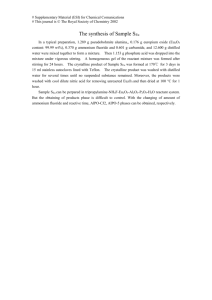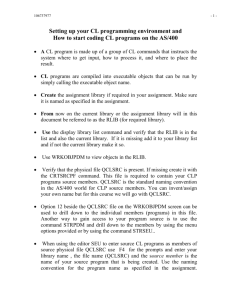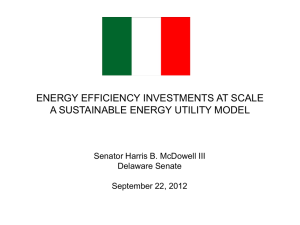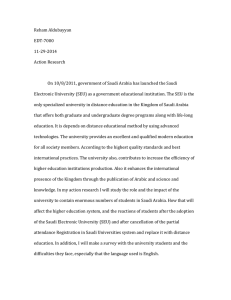Document 10441159
advertisement
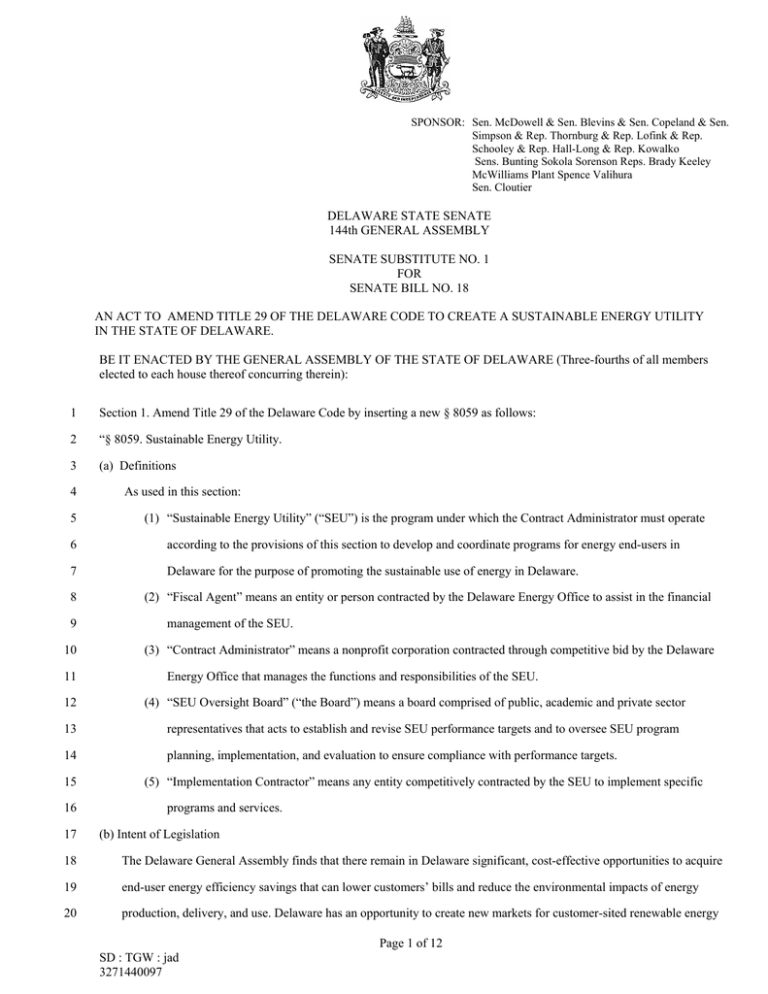
SPONSOR: Sen. McDowell & Sen. Blevins & Sen. Copeland & Sen. Simpson & Rep. Thornburg & Rep. Lofink & Rep. Schooley & Rep. Hall-Long & Rep. Kowalko Sens. Bunting Sokola Sorenson Reps. Brady Keeley McWilliams Plant Spence Valihura Sen. Cloutier DELAWARE STATE SENATE 144th GENERAL ASSEMBLY SENATE SUBSTITUTE NO. 1 FOR SENATE BILL NO. 18 AN ACT TO AMEND TITLE 29 OF THE DELAWARE CODE TO CREATE A SUSTAINABLE ENERGY UTILITY IN THE STATE OF DELAWARE. BE IT ENACTED BY THE GENERAL ASSEMBLY OF THE STATE OF DELAWARE (Three-fourths of all members elected to each house thereof concurring therein): 1 Section 1. Amend Title 29 of the Delaware Code by inserting a new § 8059 as follows: 2 “§ 8059. Sustainable Energy Utility. 3 (a) Definitions 4 As used in this section: 5 (1) “Sustainable Energy Utility” (“SEU”) is the program under which the Contract Administrator must operate 6 according to the provisions of this section to develop and coordinate programs for energy end-users in 7 Delaware for the purpose of promoting the sustainable use of energy in Delaware. 8 9 10 11 12 (2) “Fiscal Agent” means an entity or person contracted by the Delaware Energy Office to assist in the financial management of the SEU. (3) “Contract Administrator” means a nonprofit corporation contracted through competitive bid by the Delaware Energy Office that manages the functions and responsibilities of the SEU. (4) “SEU Oversight Board” (“the Board”) means a board comprised of public, academic and private sector 13 representatives that acts to establish and revise SEU performance targets and to oversee SEU program 14 planning, implementation, and evaluation to ensure compliance with performance targets. 15 16 17 (5) “Implementation Contractor” means any entity competitively contracted by the SEU to implement specific programs and services. (b) Intent of Legislation 18 The Delaware General Assembly finds that there remain in Delaware significant, cost-effective opportunities to acquire 19 end-user energy efficiency savings that can lower customers’ bills and reduce the environmental impacts of energy 20 production, delivery, and use. Delaware has an opportunity to create new markets for customer-sited renewable energy Page 1 of 12 SD : TGW : jad 3271440097 21 generation that will help build jobs in the State of Delaware, improve our national security, keep value within the local 22 economy, improve energy reliability, and protect Delawareans from the damaging effects of recurrent energy price 23 spikes. 24 25 (c) Sustainable Energy Utility Administrative Organization (1) This Act creates the “Sustainable Energy Utility” (“SEU”). The SEU program through the Contractor 26 Administrator shall design and deliver comprehensive end-user energy efficiency and customer-sited 27 renewable energy services to Delaware’s households and businesses. The SEU shall be unaffiliated with any 28 of the State’s electric or gas utilities, public or private, and it will operate through the Contract Administrators 29 under contract to the Delaware Energy Office (“Energy Office” or “DEO”) under the direction of the State 30 Energy Coordinator. The SEU shall be known by a trade name to be determined by the Delaware Energy 31 Office. 32 (2) Routine administration of the SEU shall be managed by a Contract Administrator. The funds to support the 33 SEU’s activities shall be managed by a Fiscal Agent. This institutional structure, with ultimate responsibility 34 for oversight residing with the Delaware Energy Office under the direction of the State Energy Coordinator 35 and the Oversight Board, as detailed in subsections (d) and (e), is intended to protect not only the SEU’s 36 independence, but also to assure that its performance is continually and closely monitored and that it always 37 has the strongest incentives to operate as efficiently as possible. The SEU Contract Administrator (“CA”) and 38 Fiscal Agent (“FA”) will be selected by the Delaware Energy Office through an open, competitive bidding 39 process. 40 (d) Responsibilities of the Delaware Energy Office 41 The Delaware Energy Office shall assume the following responsibilities relating to the development, implementation, 42 and monitoring of the SEU: 43 (1) The Energy Office shall prepare Requests for Proposals (RFPs) to solicit bid proposals to engage each of the 44 two administrator contractors: the SEU Contract Administrator and the Fiscal Agent. The RFPs shall be open 45 to public comment, amended if necessary, and then submitted to the Oversight Board for approval prior to 46 release. To maintain independence between each of the administrative functions, any bidder for an 47 administrator contract, and any bidder’s affiliate, shall not concurrently hold or be awarded the other 48 administrator contract. Neither shall any bidder for the Contract Administrator be affiliated with a utility, 49 public or private, that operates in Delaware, or any agency of the State of Delaware, or any entity providing 50 power or fuel to Delaware’s distribution utilities or residents. 51 a. The Energy Office shall determine and describe in detail in the RFPs the following: the roles of each 52 contracted position; the relevant performance targets set by legislation, the Energy Office or the Page 2 of 12 SD : TGW : jad 3271440097 53 Oversight Board; the bidding and contract procedures; the criteria for evaluation of bid proposals; and the 54 annual reporting requirements. In addition, the Energy Office shall define performance incentives such 55 that if the SEU exceeds program targets by 120% it shall receive a bonus, and if the SEU achieves less 56 than 80% of program targets it shall be charged a penalty. By written agreement between the DEO and 57 the SEU, performance incentives may be passed through to Implementation Contractors when the DEO 58 and SEU decide this is in the best interest of the State’s development of sustainable energy resources. 59 b. The Energy Office must require bidders for the SEU Contract Administrator to present, in their proposals, 60 plans including, but not limited to: evaluation, monitoring and verification of program performance; data 61 collection and management; and financial management. 62 c. The Energy Office shall ask bidders for the SEU Contract Administrator to describe how they will obtain 63 information from, and be responsive to, the public, and how bidders intend to resolve disputes with 64 stakeholders and customers. 65 d. The Energy Office shall evaluate the proposals based on criteria outlined in the RFP and then select and 66 67 hire the contractors for the two positions. e. The Energy Office shall determine the contract period for each administrator position, but such periods 68 shall be no less than three years and no more than five years. The Energy Office may offer a renewal 69 contract to a current contractor for one additional contract term, provided the contractor has met or 70 exceeded expectations and the Oversight Board approves of the renewal. The contract must be open to the 71 public through the RFP process after two consecutive terms by one contractor. 72 73 74 (2) The Energy Office shall report biannually to the Oversight Board on the progress of the SEU and the management of the Contract Administrator and Fiscal Agent contracts. (3) The Energy Office shall ensure continuity of program implementation and sufficient carry-over funding 75 during the transition period between the end of one SEU contract term and the beginning of another SEU 76 contract term, so that Delawareans may still have regular access to sustainable energy services during 77 transitional periods. 78 79 80 (4) The Energy Office must use the appropriate responsibilities outlined in the subsections (f) and (g) to develop additional RFP guidelines for each contractor. (5) The Energy Office shall develop appropriate means to issue Renewable Energy Certificates and Solar 81 Renewable Energy Certificates, as defined in Title 26 § 352 of the Delaware Code, for renewable energy 82 technologies sited in Delaware. Page 3 of 12 SD : TGW : jad 3271440097 83 84 (e) SEU Oversight Board (1) There is hereby created the SEU Oversight Board which shall, from passage of this Act until January 31, 85 2008, consist of all members of the Sustainable Energy Utility Task Force (“Task Force”) appointed pursuant 86 to Senate Concurrent Resolution 45 from the 143rd General Assembly and Senate Concurrent Resolution 6 87 from the 144th General Assembly. By December 31, 2007 the Task Force shall recommend to the General 88 Assembly the composition of the Board to serve after January 31, 2008. 89 90 91 92 (2) The Chair of the Sustainable Energy Utility Task Force shall preside as Chairperson of the Board or shall appoint a presiding officer for the Board from among the members. (3) Board Members shall serve without compensation except for travel allowed in paragraph (8) of this subsection. 93 (4) No Board Member shall receive financial gain from service on the Board. 94 (5) Board Members shall not be employed by any organization directly or indirectly affiliated with the SEU or its 95 contractors for a period of not less than two (2) years after the end of their service on the Board. 96 (6) The Board shall adopt by-laws, within three months from the enactment of this section, to govern itself. 97 (7) The Board shall have the following responsibilities: 98 a. Review and approve Requests for Proposals developed by the Energy Office for the contracts of the SEU 99 100 Contract Administrator and Fiscal Agent. b. Review and approve the annual and contract-term SEU performance targets recommended by the Contract 101 102 Administrator. c. Review and approve any proposed modifications to SEU performance targets or program designs during 103 104 the contract term of the Contract Administrator. d. Contract an independent professional agency to monitor and verify results reported by the Contract 105 106 Administrator in annual and contract-term reports. e. Receive biannual reports from the Energy Office, as described in subsection (d)(2), and offer 107 108 recommendations to the Energy Office regarding the management of the SEU. (8) In order for the Board to meet its obligations, the SEU shall annually set aside a budget at the beginning of the 109 State fiscal year not to exceed seventy-five thousand real 2007 dollars, and not to be less than fifty thousand 110 real 2007 dollars. Use of these funds shall be limited to the following: 111 a. 112 Payment of consultant fees for independent analyses of policy and program options to improve SEU performance voted by two-thirds of Board members. 113 b. Supported travel by Oversight Board members to conferences and workshops of direct relevance to 114 sustainable energy market development and performance. Supported travel is capped for individual Page 4 of 12 SD : TGW : jad 3271440097 115 members at three thousand real 2007 dollars and only one supported travel can be requested by a member 116 in a fiscal year. 117 c. Sponsorship of annual statewide competitions by elementary, middle and/or high school students in the 118 State of Delaware to recommend SEU service logos, mottos or new sustainable energy measures. 119 d. Other uses as voted by two-thirds of the members of the Oversight Board that can be shown to directly 120 121 improve the performance of the SEU and/or the State’s development of sustainable energy resources. (f) Responsibilities of the Fiscal Agent 122 The Fiscal Agent shall assist the Energy Office with the financial management of the SEU program. The Fiscal Agent 123 is the SEU’s “Treasury.” The FA may be contracted by fee only or by a fee-plus-incentive structure as determined by 124 the Energy Office. The primary responsibilities of the Fiscal Agent are to: 125 (1) Receive funds for the SEU from the funding sources outlined in subsection (j), disburse these funds to the 126 SEU Contract Administrator under the direction of the Energy Office, and keep accurate records of such 127 transactions; 128 (2) Interface with bonding and revenue authorities; 129 (3) Oversee financial transactions involving renewable energy certificates (RECs) and possible Solar Lifeline 130 activities; and 131 (4) Pay SEU invoices. 132 (g) SEU Contract Administrator Responsibilities 133 The SEU Contract Administrator will manage the day-to-day functions and responsibilities of the SEU. The Contract 134 Administrator’s chief responsibilities are program research and design, administration of the Implementation Contracts, 135 and oversight to ensure the Implementation Contractors meet appropriate performance and budgetary targets. The 136 Contract Administrator may be contracted by fee only or by a fee-plus-incentive structure as determined by the Energy 137 Office. 138 139 (1) Program Research and Design a. The Contract Administrator shall undertake a comprehensive resource analysis (“Analysis”) to support 140 initial program planning for the SEU. The Analysis must include demographic energy use assessments, 141 population and economic growth estimates, energy consumption forecasts, regional energy efficiency 142 trend analyses, technical and economic potential estimates, and market potential assessments. The 143 comprehensive resource analysis must: 144 1. 145 assess energy end-user markets, including electricity end-uses, natural gas end-uses, clean vehicles, green buildings, weatherization, and affordable energy services; Page 5 of 12 SD : TGW : jad 3271440097 146 2. 147 industrial, agricultural, and transportation sectors; and 148 3. 149 150 assess energy end-user demographic sectors, including low-income, residential, commercial, assess energy end-use equipment, including appliances, lighting, heating, cooling, industrial processes, and vehicles. b. Using the results from the Analysis from subparagraph (1)(a) of this subsection, the Contract 151 Administrator shall select markets, end-users, and end-use equipment for the SEU to target through its 152 programs. 153 c. The Contract Administrator shall develop a comprehensive suite of program designs based on the 154 Analysis and selected markets, end-users, and end-use equipment, as described in subparagraphs (1)(a) 155 and (1)(b) of this subsection. Each program design must specify, at minimum, program goals, 156 performance targets, an estimated budget, an implementation strategy, and an evaluation strategy. The 157 Contract Administrator is not required to design or initiate all programs at once, but it must demonstrate 158 how each program fits within the Contract Administrator’s overall strategy to meet its own performance 159 targets as well as the SEU’s long-term performance targets established in subsection (i) of this Act. 160 d. The Contract Administrator is expected to fulfill the following responsibilities through program designs, 161 RFPs for Implementation Contractors, and program implementation: 162 1. 163 to be responsive to customers and market forces in implementing and redesigning the programs it delivers; 164 2. 165 to design a portfolio of programs to allow all energy end-users, regardless of electricity or gas retail providers, and regardless of market segment or end-use fuel, to participate in the SEU programs; 166 3. 167 to promote program initiatives and market strategies that address the needs of persons or businesses facing the most significant barriers to participation; 168 4. 169 to promote coordinated program delivery, including coordination with low income weatherization programs, other efficiency programs, and utility programs; 170 5. 171 to coordinate with relevant regional and national energy efforts and markets, including markets for pollution emissions offsets and credits, and renewable energy credits; 172 6. to consider innovative approaches to delivering sustainable energy services, including strategies to 173 encourage third party financing and leveraged customer contributions to the cost of program 174 measures, as consistent with principles of sound program design; 175 7. to offer “one-stop shopping” and be the point-of-contact for sustainable energy services in Delaware; 176 8. to create a comprehensive website that provides easy access to SEU programs and information for all 177 Delawareans, allowing them to participate in SEU programs electronically; Page 6 of 12 SD : TGW : jad 3271440097 178 9. to emphasize “lost opportunity” markets, which are sustainable energy measures that can only be 179 cost-effectively captured at particular times, such as during new construction or extensive 180 remodeling; and 181 182 10. to emphasize market strategies to deliver services. e. The Contract Administrator shall continue to research and assess the resources and market needs for 183 sustainable energy services in Delaware, as described in subparagraph (1)(a) of this section, while 184 program implementation is ongoing. The Contract Administrator and other stakeholders will use this 185 research to assess the impacts and effectiveness of SEU programs; to make adjustments to SEU program 186 performance targets; to reassess targeted markets, end users, and end uses; and to recommend further 187 policy initiatives for consideration by the Delaware Legislature. 188 189 (2) Administration of Implementation Contracts a. With the exception of education and public outreach programs, which the Contract Administrator may 190 implement itself with approval of the Energy Office and Oversight Board, all other SEU programs must 191 be delivered by competitively selected Implementation Contractors. 192 b. The SEU shall propose rules to guide the bidding process and criteria to guide bid selection. The RFPs 193 shall specify a contract term of no less than two years, and, in order to ensure program continuity during 194 transition periods, no longer than six (6) months beyond the Contract Administrator’s contract term with 195 the Energy Office. 196 c. The Contract Administrator shall be responsible for selecting winning Implementation Contractor bids. 197 d. Any entity, including electricity or gas utilities in the State of Delaware, may bid for an Implementation 198 Contract. If an affiliate of the Contract Administrator bids, or intends to bid, for an Implementation 199 Contract, both the Contract Administrator and its affiliate must ensure that the affiliate does not benefit 200 from any unfair advantage resulting from insider information. 201 e. 202 203 RFPs for competitively bid Implementation Contracts should include provisions for performance-based incentives as appropriate to ensure that program targets are achieved or exceeded. f. If an Implementation Contractor is not successfully selected through the RFP bidding process, the 204 Contract Administrator may implement its own program delivery process subject to approval by the 205 Energy Office and Oversight Board. 206 207 (3) Oversight, Monitoring, and Verification a. The Oversight Board must review the Contract Administrator’s proposed program designs, performance 208 targets, and RFPs before the Contract Administrator submits RFPs for bid. When reviewing and 209 approving the SEU’s programs and RFPs, the Oversight Board must ensure that program coordination Page 7 of 12 SD : TGW : jad 3271440097 210 between the Contract Administrator, Implementation Contractors, and customers is as streamlined and 211 simple as possible from the customer’s perspective. The Oversight Board shall ensure that the SEU’s 212 programs will provide packaged-services. Rather than simply providing the most cost-effective or easiest- 213 to-provide services, packaged-services must be designed to provide customers with as many relevant end- 214 use services at once, each time the Contract Administrator or the Implementation Contractors have 215 contact with a customer. 216 b. The Contract Administrator must develop and maintain information services to collect all performance, 217 market, and financial data necessary to monitor and evaluate SEU performance as specified in its contract 218 with the Energy Office. The Contract Administrator must make such data available to the Energy Office 219 and Oversight Board upon request. 220 c. Consistent with the specific terms of its contract and generally accepted accounting principles, the 221 Contract Administrator must prepare and submit detailed documentation and invoices for administrative, 222 management, and program costs to the Fiscal Agent for review in order to receive payment. 223 d. 224 225 The Contract Administrator must develop appropriate mechanisms to accurately evaluate, monitor, and verify program performance and Implementation Contractor performance. e. The Contract Administrator shall have 30 days to respond to complaints from, or disputes among, 226 affected persons or entities. After 30 days any unresolved complaints shall be presented to the Energy 227 Office and Oversight Board. 228 f. The Contract Administrator shall submit to the Oversight Board for approval any reports produced by the 229 Contract Administrator that codify current practices or detail new practices or substantive changes in the 230 SEU’s implementation of programs and services. 231 g. 232 233 234 The Contract Administrator shall conduct site visits and review the files of the Implementation Contractors as necessary to ensure contract compliance. (h) Evaluation, Monitoring, and Verification (1) The Energy Office must ensure that adequate evaluation, monitoring, and verification mechanisms are in 235 place so that: 236 (a) The Energy Office and Oversight Board can verify that both SEU and Implementation Contractor 237 expenditures result in verifiable energy savings over the expected lifetime of each energy-saving 238 measure. 239 (b) The SEU and Implementation Contractors are held responsible for the energy savings reportedly achieved 240 241 through program activities and expenditures. (i) SEU Initial Program Targets Page 8 of 12 SD : TGW : jad 3271440097 242 (1) Energy Efficiency 243 By December 31, 2015, the SEU shall have achieved an average 30% reduction in annual energy usage for 244 SEU participants, with a target of one-third (1/3) of the participant savings occurring for residential clients, 245 based on January 1, 2006 baseline levels. The Energy Office and Oversight Board may increase or accelerate 246 this target if a comprehensive resource analysis indicates a greater cost-effective end-user energy efficiency 247 potential exists or if the SEU achieves performance targets ahead of schedule. 248 (2) Delaware Solar Lifeline 249 For the purposes of this subsection, a low-income household shall be defined as a household that qualifies for 250 Low-Income Home Energy Assistance Program (LIHEAP) assistance in the State of Delaware. The SEU shall 251 have the authority to administer the Delaware Solar Lifeline program, which shall provide, by December 31, 252 2015 each low-income household with a life-sustaining supply of at least 200 kilowatt-hours per month of 253 low-cost electricity not to exceed 5 cents per kWh in real 2007 dollars from in-state solar electric resources, 254 the electricity generated thereof dedicated entirely for use by low-income households in the Solar Lifeline 255 program. The Energy Office shall devise annual Solar Lifeline program goals that specify a targeted amount 256 of installed photovoltaic capacity and a targeted number of households to be served. Such targets shall 257 increase at a reasonable rate each year until sufficient in-state photovoltaic capacity has been installed to 258 provide, by December 31, 2015, each low-income household with at least 200 kilowatt-hours per month of 259 low-cost solar electricity. Implementation of the Solar Lifeline program and the obligation to meet the 260 December 31, 2015 target shall depend upon the DEO and SEU obtaining the approval of the Oversight 261 Board, as voted by a majority of Board members. The chief criterion for Board approval shall be that the DEO 262 and SEU have identified self-sustaining funds for the program or that the Delaware Legislature has approved 263 designated funds for the purpose of maintaining the Solar Lifeline program. 264 (3) Affordable Energy 265 The SEU shall assess strategies and funding mechanisms to weatherize at least eight hundred (800) low- 266 income households per year, not counting those households served with Weatherization Assistance Program 267 funding. The SEU shall target services to households living in single-family owner-occupied units and mobile 268 homes, single-family rental units, rental buildings with five (5) units or less, and large multifamily buildings 269 with greater than five (5) units. The SEU shall target three low-income levels: 200% of the federal poverty 270 level, 60% of the state median income, and 80% of the state median income. 271 (4) Green Buildings and Clean Vehicles Page 9 of 12 SD : TGW : jad 3271440097 272 a. The Delaware Energy Office shall define “Green Buildings” and “Clean Vehicles” as appropriate to meet 273 statewide energy efficiency targets established in paragraph (1) of this subsection, and with consideration 274 for current best-practice definitions. 275 b. To establish initial SEU performance targets for Clean Vehicles and Green Buildings programs, the 276 Delaware Energy Office, under the leadership of the State Energy Coordinator, and the Oversight Board 277 shall either: 278 1. 279 market programs to be included in the SEU Contract Administrator request for proposal, 280 2. 281 282 Determine appropriate initial SEU performance targets for Clean Vehicles and Green Buildings Or the Energy Office and the Oversight Board may require that bidders for the SEU Contract Administrator propose such performance targets. (5) Customer-sited Renewable Energy 283 Targets and rebate levels for Customer-sited Renewable Energy Technologies (“Customer-sited Renewables”) 284 shall be established by the DEO, under the direct supervision of the State Energy Coordinator. Customer-sited 285 Renewables shall include solar electric, solar thermal, geothermal and wind energy systems not to exceed in 286 capacity the levels specified in net-metering regulations of Title 26 § 1014 of the Delaware Code. Under the 287 direct supervision of the State Energy Coordinator, the DEO shall develop incentive tiers for different 288 Customer-sited Renewables and customer classes based on identified state best practices. Rebates shall not 289 exceed fifty percent (50%) of the incremental cost of Customer-sited Renewables compared to the retail cost 290 of electricity. Rebates shall decline over time unless the DEO and SEU agree that doing so will prevent SEU 291 clients from maximizing installed capacity of Customer-sited Renewable Energy in a least-cost manner. 292 Under the direct supervision of the State Energy Coordinator, the DEO shall specify a certain fraction of SEU- 293 supported Customer-sited Renewables to be located at residential locations. The SEU shall furnish three 294 services to participants who purchase Customer-sited Renewables. First, it shall provide incentives sufficient 295 to cover the incremental cost of investing in Customer-sited Renewables, in accord with DEO incentive tiers 296 and current retail energy prices. Second, the SEU shall obtain, on behalf of participants, Renewable Energy 297 Certificates (“RECs”) and Solar Renewable Energy Certificates (“SRECs”), as defined in Title 26 § 352 of the 298 Delaware Code. Third, the SEU shall negotiate the wholesale price for RECs and SRECs for SEU 299 participants, using its ability to aggregate Customer-sited Renewables to the best advantage of SEU 300 participants. For these services, the SEU shall charge a fee sufficient to pay its costs and to maintain 301 incremental cost investments in Customer-sited Renewables. This fee can be assessed as a one-time charge or 302 an annual payment subject to the mutual agreement of the SEU and the participant. The Energy Office, under 303 direct supervision of the State Energy Coordinator, shall determine a fair and reasonable rate that the SEU Page 10 of 12 SD : TGW : jad 3271440097 304 may charge for aggregating RECs and SRECs. The SEU fee shall not exceed 35% of the retail value of RECs 305 or SRECs. 306 (j) Funding for the SEU 307 308 309 (1) The Delaware Energy Office shall contract with the SEU Contractor Administrator to assist in the administration of some or all of the Green Energy Fund in accordance with Title 29 §8057. (2) The SEU through the Contract Administrator may independently raise a series of special purpose bonds, tax- 310 exempt if eligible, with a cumulative initial value between 2007 and 2015 capped at thirty million real 2007 311 dollars ($30 million 2007). In any event, the initial SEU Contract Administrator must provide financial 312 warranty to pay its first year of administrative costs. Any such bond monies shall only be used to fund the 313 SEU Contract Administrator and its Implementation Contractors to meet responsibilities outlined in this 314 section, including administrative costs and overhead, implementation costs including the cost of contracting 315 Implementation Contractors, operating expenses, and incentive costs. Bond monies shall not fund the Fiscal 316 Agent, nor internal Energy Office responsibilities or staff, nor duties required of the Oversight Board, 317 including independent SEU evaluation, monitoring, and verification. All bond monies shall be held and 318 disbursed by the Fiscal Agent as defined in subsections (a) and (f). The State of Delaware’s general funds 319 shall not be liable for the repayment of any special purpose bonds, tax-exempt if eligible, by the Delaware 320 Energy Office on behalf of the SEU. 321 (3) Revenue sources contributing to the SEU for the purpose of paying bond debt may include but not be limited 322 to funds from shared savings agreements with SEU participants and partial proceeds from the sale of 323 Renewable Energy Credits in local and regional markets. The Green Energy Fund shall provide equity 324 leverage for the SEU. 325 (4) Staffing necessary for the DEO to fulfill its responsibilities in this Act shall be funded from the Delaware 326 Energy Answers program and by existing program funding within the Department of Natural Resources and 327 Environmental Control. SYNOPSIS This Act represents the work of the Sustainable Energy Utility Task Force. It creates the Delaware Sustainable Energy Utility (SEU) program to coordinate and promote the sustainable use of energy in Delaware. The SEU will use competitive markets and leveraged private-financing to deliver cost-effective end-use energy services that allow Delawareans to save 30% of their annual energy usage. The SEU will coordinate services that target residential, commercial, industrial, and transportation energy end-users in all energy markets, including electricity, heating fuels, green buildings, clean vehicles, customer-sited renewable energy, and affordable energy. The SEU will use competitively selected Implementation Contractors to deliver services utilizing performance based contracts. This Act creates a Fiscal Agent to serve, under contract to the Energy Office, as the SEU’s “treasury.” The Act also creates an Oversight Board to ensure that the SEU meets responsibilities and performance targets enumerated in its contract with the Energy Office. This Act creates initial performance targets for the SEU as well as evaluation and monitoring mechanisms to ensure that SEU energy savings are verifiable. The SEU Contract Administrator may receive performance incentives such that if it exceeds program targets by 120% it will receive a bonus, and if it achieves less than 80% of program targets it will be penalized. Page 11 of 12 SD : TGW : jad 3271440097 The substitute bill adds a ¾ voting requirement which is required by the constitution. This Substitute Act allows the SEU through the Contract Administrators to independently raise a series of special purpose bonds with a total value capped of $30 million between 2007 and 2015. Any such bonds may only be used to fund SEU contractors and programs. The state of Delaware will not be liable for repayment of any such bonds. Bond repayment sources may include, but not be limited to, funds from shared savings agreement with SEU participants and partial proceeds from the sale of Renewable Energy Credits in local and regional markets. The Green Energy Fund managed by the DEO with assistance from the SEU, shall provide equity leverage for the SEU. Author: Senator McDowell Page 12 of 12 SD : TGW : jad 3271440097
